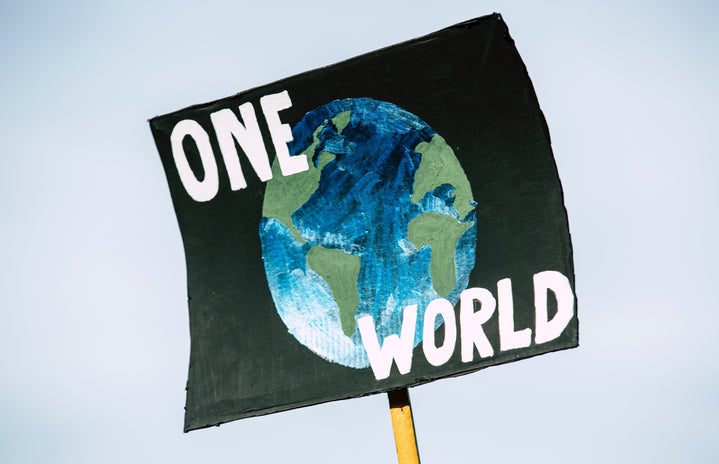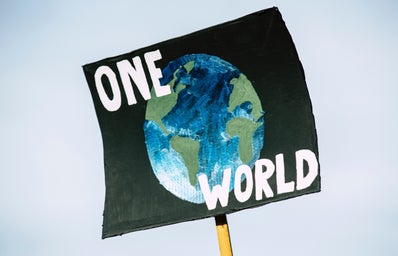With the stroke of a pen, the U.S. is back on a track that it should have never left four years ago. On January 27, President Joe Biden released his Executive Order on Tackling the Climate Crisis at Home and Abroad. The Order follows several environmental actions he took on his first day of office, including rejoining the Paris Climate Accords and cancelling the controversial Keystone XL pipeline.
Climate change is one of the most important and time sensitive challenges that the world faces, though we’ve seen political leadership greatly lacking in this area. Throughout his campaign, Biden made climate action into a key issue in his platform. His plan outlined promises for the U.S. to achieve net-zero emissions by 2050, job creation, and a focus on helping communities disproportionately affected by polluters. Another cornerstone goal of his administration is moving to reestablish the government’s commitment to trusting science, a relationship in desperate need of repair following the devastating antics of the Trump administration.
Through the Executive Order, Biden elaborates on the issues that will be tackled as well as the measures that will be put in place to achieve them. In it, he creates the largest ever assembled team of climate advisors, policy experts, and other leaders to spearhead the White House’s actions on the matter. Further areas addressed are seen in the goal for preventing federal funding from directly subsidizing fossil fuels, the establishment of the Civilian Conservation Corps, and stopping the drilling in the Arctic National Wildlife Refuge.
In affirming that climate change is a pivotal foreign and domestic policy concern as well as a national security threat, the Executive Order makes it so that all sectors of the government are involved in the planning and tracking of climate action and mitigation. This push towards taking responsibility for our nation is huge considering how much we have fallen behind the rest of the world on this issue. Adding to this, Biden makes the commitment to host a Leader’s Climate Summit this upcoming Earth Day to work back towards attaining that global leadership role.
The most defining part of this Executive Order to me is the section on “Securing Environmental Justice and Spurring Economic Opportunity.” These areas go hand in hand and have very often been pit against each other. For example, the argument of losing a ton of jobs by getting rid of the fossil fuel industry is a valid fear for many coal and oil workers. However, in investing in the establishment of a clean energy economy, we hold the keys to bringing so many more long lasting and well-paying opportunities. Switching to a more sustainable economy will not only bring economic benefits but will also make way for revitalizing marginalized communities that have been historically devastated by the effects of climate change and pollution. What’s key here is the message of not wanting to leave anyone behind put forth by Biden.
This section makes it known that in order to get over that hurdle we must work and listen to all stakeholders in these issues. This especially includes Indigenous peoples and minority and other disadvantaged communities. Climate change has disproportionately affected these groups and it is absolutely essential that we prioritize their needs and demands in order to ensure environmental justice. There should not ever be another Flint, Michigan crisis or a Dakota Access Pipeline.
These are all amazing big leaps forward. As a student in the environmental and sustainability field, the past years of constant ignorance, lies, and deregulation have caused a lot of anger and stress about what our future will be. To have someone in office now who has explicitly promised and taken immediate action on some of these promises within the very first days of their term gives me a lot of hope for what we can accomplish within the next four years.
However, it is important that we remain vigilant in holding the Biden administration accountable. Just because he’s not Trump, does not mean he will always put what needs to be done first. For instance while President Obama was lauded for his efforts in the Paris Climate Agreement and his Clean Power Plan, these actions took place at the tail end of his time in office. During much of his terms, action was taken very slowly and the opportunity for curbing greenhouse emissions sooner was passed up in favor of other issues. By not giving Biden a free pass, we can help to ensure that policies, agreements, budgets, and appointments are aligned with the principles of the environmental justice movement, are inclusive, and give voice and power to marginalized communities.
In an Instagram live Q+A session with Leah Thomas and Intersectional Environmentalist, White House Climate Adviser Ali Zaidi expressed that the major reason why we have now finally brought climate change to the forefront of the agenda is thanks to the largely youth-led movement. Youth activism continues to push leaders and institutions, take the lead on protests, and share resources and support through wide reaching social networks.
It’s because of this activism and this commitment from so many young people across the world that I do feel that this can put us in the right direction. The new administration has shown that it is willing to put together a solid plan that is one of the most comprehensive ones that the U.S. has related to climate change. I think that we find ourselves much more empowered and visible to those in power and with that can make the changes necessary to stay afloat.



